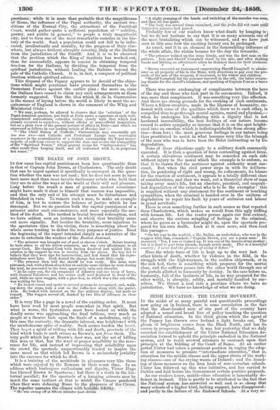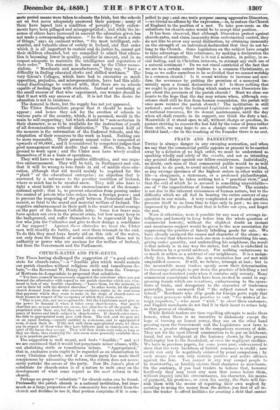IRISH EDUCATION: THE ULSTER. MOVEMENT.
IN the midst of so many painful and questionable proceedings now going on, in Ireland, there' is some consolation in the fact that the clear-headed men of one part of the country have adopted a sound and broad line of policy touching the question of National education. In the thick gloom which the agent of the Papacy has thrown over Ireland a light breaks out. The gleam of brightness comes from the Black North, and has its source in prosperous Belfast. It was but yesterday that we duly recorded the establishment of the Ulster National Education As- sociation formed to uphold the principle embodied in the National system, and to resist avowed attempts to encroach upon that principle at the bidding of the Court of Rome. At an earlier period. Ulster had taken a prominent position in. urging the adop- tion of measures to promote "intermediate education," that is, education for the middle classes and the upper strata of work- ing classes—one of the crying wants of Ireland ; and the found- ing of those measures on the firm basis of non-sectarian schools. Ulster has followed up this wise initiative and has carried to Dublin and laid before the Government certain positive proposals.
As our readers know, middle-class education is lamentably de- ficient in Ireland. This is partly to be attributed to the fact that the National system has answered so well and is so cheap that many schools of a higher kind, lacking support, have disappeared ; and partly to the failure of the Endowed Schools. At a very re- mote period means were taken to educate the Irish, but the schools set on foot never adequately answered their purpose ; many of them have lapsed into a condition of poverty; their endow- ments have been pillaged and misappropriated ; and while the in- comes of others have increased in amount the education given has not made a corresponding advance. " In the face of such a state of things," says an eminent writer, " the most intelligent, sub- stantial, and valuable class of society in Ireland, and that order which it is all important to sustain and do justice to, cannot get their children educated, but are compelled to admit that educa- tion is becoming lower in quality, scantier in amount, and in no respect adequate to maintain the intelligence and reputation of their order." This statement is borne out by the Ulster memo- rialists. " Merchants and manufacturers" they say, " have a difficulty in finding educated clerks and skilled workmen." The very Queen's Colleges, which have had to encounter so much opposition, prejudice, and misrepresentation, have had this addi- tional disadvantage to contend with, that there are no schools capable of feeding them with students. Instead of wondering at the small success of that wise experiment, our wonder should be that it met with any success at all. It is not that the desire for education is not in existence. The demand is there, but the supply has not yet appeared.
The Ulster Memorialists propose that it should be made to appear ; and hence they ask for the erection of schools in various parts of the country, 'which, it is assumed, would in the main be self-supporting ; but which should be " non-sectarian in their character, so as to be available for the instruction of youth of all denominations without distinction." The second half of the measure is the reformation of the Endowed Schools, and the adaptation of their resources-to the'work in hand. Nothing can be more reasonable. Their present annual value is computed at upwards of 68,0001., and it is considered by competent judges that good management would double that sum. Here, then, is firm ground to work upon ; and the Ulster men have wisely availed themselves of it as a basis of operations. They will have to meet two positive difficulties, and one nega- tive embarrassment. They will be told, in Parliament and out, that it will be wrong.to vote funds in aid of middle class edu- cation, although that aid would mainly be required for the "plant " of the educational enterprise ; an objection that is answered by a reference to the peculiar condition of Ireland, where so much has to be created anew. They will also have to fight a stout battle to resist the encroachments of the denomi- national spirit ; that is, to prevent education from passing under the control of priests who take orders from a foreign power ; and to prevent the reopening of the gulf between Protestant and Ro- manist, so fatal to the moral and material welfare of Ireland. The negative embarrassment in their path is the want of moral courage on the part of the Roman Catholic laity. Some few brave men have spoken out even in the present crisis, but how many keep in the background, and suffer themselves to be represented by the few who join the Cullenites and give to their doings a semblance of lay support ? Against these obstacles we trust the Ulster men will steadily do battle, and over them triumph in the end. To do this they must have hearty aid on this side of the water, not only from the friends of sound education, and those not in authority Or p_bWer who are anxious for the welfare of Ireland, but from the Governinefit and the Parliament.































 Previous page
Previous page